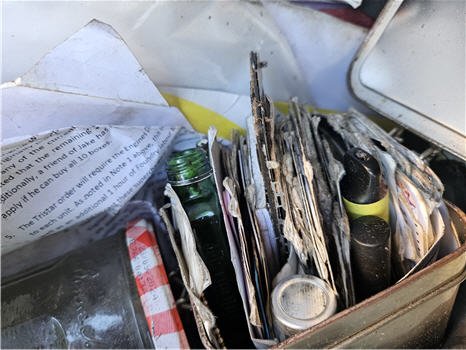On Fate and Kindness
He’d become a part of the park – the man with dreaded hair and old clothes and garbage bags tied around his disintegrating shoes.
My wife and I walk our little dog there and every time we’d let Bear off his lead, he’d run to this strange man, strangely attracted to him who’d always be fastidiously fixed, sorting through his bag of odds and ends, or marching around the park in circles talking animatedly to himself and the others in his head.
Normally the man wouldn’t seem to even notice Bear, still a puppy, who still hasn’t yet developed a fear of either dog or man. But that day, he stopped, bent down and easily stroked Bear’s head. I’d always been nervous of Bear being so close to someone so utterly unpredictable. But his unexpected tenderness evaporated any anxiety I’d had of this man I’d never spoken with, who has no name, or home, and for the first time he’d become a softer part of our little world.
Until the police came, of course.
After we’d left, a stench of cheap pot wafted over the wall and into our kitchen. We went outside to watch him smoke a crudely rolled joint, worrying that it would rattle him in the wrong way, send whatever he’d managed to keep bottled up loose. And sure enough, five minutes later, he was screaming, rounding in manic circles as if being chased by something awful.
Someone of course called the cops. And amazingly, they arrived for once, if force, even flanked by a few loitering security guards. Watching, through the rusting barbed wire fencing that separates our semi-secure complex from the wilderness of the park, they’d circled him, their words indistinct, approaching him cautiously with palms out like he were some wild animal.
Then they began shouting when it’s clear the only response he would give them was a shaking of his head. It was scary to witness how fast words rapidly devolve, how they conjure violence. Two of the cops then suddenly grabbed him and began lurching him forward towards the gate to the street, one of them twisting his arm around his back making him shriek.
He didn’t want to go with them. He just wanted to stay. But his choices were gone.
And when they’d eventually bundled him into the back of the cop van and slam the caged-windowed door, I could only hope they wouldn’t hurt him later for making the end of their hard day, harder.
What happens to someone that doesn’t fit, that frightens us with their strangeness or their lack of social decorum? What happens to those that fill our air with frightening sounds or scary ideas we don’t want to think about? What happens when the world sees you as crazy? Something like this happens.
They’ll cast him into the system my wife told me with lament. He’d probably wound up in a packed holding cell. Maybe for many days, or weeks, before finding a space at a state psychiatric ward, already overwhelmed, the health care system in my country long broken. He’ll go through it though and it and in the end they won’t have the resources to help him. Like a field hospital in the war of poverty, they’ll medicate him, clean him up and eventually send him on his way again – back to the streets.
After they’d driven off, we wondered whether they had taken his belongings with them, that they might have afforded him a small mercy by bringing with them his only worldly possessions. But we could see over the wall they were still lying on one of the park tables where he’d left them in disarray.
By the time we’d crossed back over to the park, a man had thrown it all in a dust bin. He’d watched us unapologetically and then disgusted when we digged his old leather bag out. It was stuffed with what he’d collected, discarded things from the streets and garbage bins of our suburb. He’d tried to give all the things an order and place, had sorted and resorted them as if trying to divine some magical configuration that would solve the diabolical puzzle of this mad world he lives in where he’s the only sane man.
Six weeks on, his bag still sits in my garage. He hasn’t returned.
The bag makes me feel inept and every time I glimpse I’m reminded of a neighbour that I had once who I also couldn’t help in the end.
I’d noticed her one night, looking up from my manuscript, as she tried to get her car out of the car park. It was clear something was wrong when her car kept bumping against the curb as if she just couldn’t get it to go in any other direction.
When I went outside and tapped on her window, she’d rolled it down and stared at me, her eyes swimming, her face drugged, and she told me she just needed to go, but she couldn’t tell me where.
After convincing her that she really shouldn’t, couldn’t drive, I carefully got her out of her car, my wife holding her steady while I parked it.
We’d taken her back inside her townhouse we’d never been in. It was dimly lit, her little dog’s whimper barely audible over the blaring television, something rotting in the kitchen of unwashed dishes, the floor barely visible under so many derelict possessions it was impossible not to step on them.
I had to remove a tonne of clothing from her bed, as if she’d been busy sorting through all her clothes for hours, undecided of what to throw away, what to wear, what to take with her, like she’d wanted to leave but couldn’t think of where to go.
And when we laid her down, she asleep before her head hit the pillow, her bedside table surface choked with bottles of prescriptions, picture frames with old photos of people we’d never seen visit staring happily into her single room, we’d left and closed her front door we weren’t able to lock.
When I saw her come home the next evening, I went out to her. I wanted to ask how she was. I remember feeling extremely awkward, for her, for myself, unsure of what really to say about the night before.
But she’d just said hello in her usual shy way before going into her house and closing the door.
I’ve thought about her often over the past weeks, the man’s bag still sitting to be reclaimed in my dusty garage.
I’ve wondered if she’s still alive. But it was a long time ago and she was already old. I’ve wondered if any of the people in the picture frames I never saw visit her had been at her funeral. I wonder if I had tried to help beyond that night, would it have made things worse me sticking my nose into someone else’s life, uninvited?
I sometimes feel there’s nothing we can do about another’s suffering other than nudge it away from a precipice, that people’s lives, as sad as they might seem to us, are still their own, that there is still dignity there, and that they must follow their own trajectories towards whatever fate has in store for them. That they are capable when we think they’re not. That helping through pity or compassion so often confused, might not be helping at all in the end.
Maybe it’s all timing. Stepping in when you have to just for that precarious moment or that small kindness.
So I’ll keep the man’s bag. I hope, if he ever returns, I can give it back to him one day for him to keep or through away as he see fit.
On Fate and Kindness
He’d become a part of the park – the man with dreaded hair and old clothes and garbage bags tied around his disintegrating shoes.
My wife and I walk our little dog there and every time we’d let Bear off his lead, he’d run to this strange man, strangely attracted to him who’d always be fastidiously fixed, sorting through his bag of odds and ends, or marching around the park in circles talking animatedly to himself and the others in his head.
Normally the man wouldn’t seem to even notice Bear, still a puppy, who still hasn’t yet developed a fear of either dog or man. But that day, he stopped, bent down and easily stroked Bear’s head. I’d always been nervous of Bear being so close to someone so utterly unpredictable. But his unexpected tenderness evaporated any anxiety I’d had of this man I’d never spoken with, who has no name, or home, and for the first time he’d become a softer part of our little world.
Until the police came, of course.
After we’d left, a stench of cheap pot wafted over the wall and into our kitchen. We went outside to watch him smoke a crudely rolled joint, worrying that it would rattle him in the wrong way, send whatever he’d managed to keep bottled up loose. And sure enough, five minutes later, he was screaming, rounding in manic circles as if being chased by something awful.
Someone of course called the cops. And amazingly, they arrived for once, if force, even flanked by a few loitering security guards. Watching, through the rusting barbed wire fencing that separates our semi-secure complex from the wilderness of the park, they’d circled him, their words indistinct, approaching him cautiously with palms out like he were some wild animal.
Then they began shouting when it’s clear the only response he would give them was a shaking of his head. It was scary to witness how fast words rapidly devolve, how they conjure violence. Two of the cops then suddenly grabbed him and began lurching him forward towards the gate to the street, one of them twisting his arm around his back making him shriek.
He didn’t want to go with them. He just wanted to stay. But his choices were gone.
And when they’d eventually bundled him into the back of the cop van and slam the caged-windowed door, I could only hope they wouldn’t hurt him later for making the end of their hard day, harder.
What happens to someone that doesn’t fit, that frightens us with their strangeness or their lack of social decorum? What happens to those that fill our air with frightening sounds or scary ideas we don’t want to think about? What happens when the world sees you as crazy? Something like this happens.
They’ll cast him into the system my wife told me with lament. He’d probably wound up in a packed holding cell. Maybe for many days, or weeks, before finding a space at a state psychiatric ward, already overwhelmed, the health care system in my country long broken. He’ll go through it though and it and in the end they won’t have the resources to help him. Like a field hospital in the war of poverty, they’ll medicate him, clean him up and eventually send him on his way again – back to the streets.
After they’d driven off, we wondered whether they had taken his belongings with them, that they might have afforded him a small mercy by bringing with them his only worldly possessions. But we could see over the wall they were still lying on one of the park tables where he’d left them in disarray.
By the time we’d crossed back over to the park, a man had thrown it all in a dust bin. He’d watched us unapologetically and then disgusted when we digged his old leather bag out. It was stuffed with what he’d collected, discarded things from the streets and garbage bins of our suburb. He’d tried to give all the things an order and place, had sorted and resorted them as if trying to divine some magical configuration that would solve the diabolical puzzle of this mad world he lives in where he’s the only sane man.
Six weeks on, his bag still sits in my garage. He hasn’t returned.
The bag makes me feel inept and every time I glimpse I’m reminded of a neighbour that I had once who I also couldn’t help in the end.
I’d noticed her one night, looking up from my manuscript, as she tried to get her car out of the car park. It was clear something was wrong when her car kept bumping against the curb as if she just couldn’t get it to go in any other direction.
When I went outside and tapped on her window, she’d rolled it down and stared at me, her eyes swimming, her face drugged, and she told me she just needed to go, but she couldn’t tell me where.
After convincing her that she really shouldn’t, couldn’t drive, I carefully got her out of her car, my wife holding her steady while I parked it.
We’d taken her back inside her townhouse we’d never been in. It was dimly lit, her little dog’s whimper barely audible over the blaring television, something rotting in the kitchen of unwashed dishes, the floor barely visible under so many derelict possessions it was impossible not to step on them.
I had to remove a tonne of clothing from her bed, as if she’d been busy sorting through all her clothes for hours, undecided of what to throw away, what to wear, what to take with her, like she’d wanted to leave but couldn’t think of where to go.
And when we laid her down, she asleep before her head hit the pillow, her bedside table surface choked with bottles of prescriptions, picture frames with old photos of people we’d never seen visit staring happily into her single room, we’d left and closed her front door we weren’t able to lock.
When I saw her come home the next evening, I went out to her. I wanted to ask how she was. I remember feeling extremely awkward, for her, for myself, unsure of what really to say about the night before.
But she’d just said hello in her usual shy way before going into her house and closing the door.
I’ve thought about her often over the past weeks, the man’s bag still sitting to be reclaimed in my dusty garage.
I’ve wondered if she’s still alive. But it was a long time ago and she was already old. I’ve wondered if any of the people in the picture frames I never saw visit her had been at her funeral. I wonder if I had tried to help beyond that night, would it have made things worse me sticking my nose into someone else’s life, uninvited?
I sometimes feel there’s nothing we can do about another’s suffering other than nudge it away from a precipice, that people’s lives, as sad as they might seem to us, are still their own, that there is still dignity there, and that they must follow their own trajectories towards whatever fate has in store for them. That they are capable when we think they’re not. That helping through pity or compassion so often confused, might not be helping at all in the end.
Maybe it’s all timing. Stepping in when you have to just for that precarious moment or that small kindness.
So I’ll keep the man’s bag. I hope, if he ever returns, I can give it back to him one day for him to keep or through away as he see fit.









